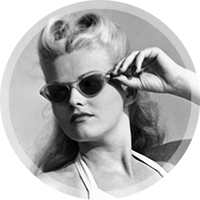

Several years ago, I met a gypsy woman in the middle of a tiny town in the middle of Ohio Amish country. I call her “gypsy” because that’s what she called herself; I don’t know if she genuinely came from the Romani tradition or had simply appropriated its trappings. She ran an antique store in an old house painted bright purple with yellow trim. Its front stoop read “Gypsy Folk Shoppe” and beside its front door was a hand painted blessing for travelers.
I stepped inside feeling particularly unblessed. At the time, I was a struggling single mother of an infant subsisting on welfare benefits, leftover student loan funds and odd, vaguely unpleasant jobs like the one I was currently doing: collecting petition signatures. Unsurprisingly, it was difficult to find many people on the sidewalks of tiny Ohio towns in Amish country to sign petitions. I went into the antique store not only bored, but slowly drowning under the realization I might never get out of this trap, that I might always be desperate for money and support and hope, that it was entirely possible life would just break me, into pieces, just as it had so many others, and that’s just was all there was. In the store, I picked up trinkets, turned them over in my hands. Remnants of people’s lives that were now for sale. Who knows what happened to them. Who knows who cared.
I located my standby source of comfort in antique and thrift shops: the book shelf. I couldn’t really afford anything, but, for some reason, I needed something, so I found a cheap paperback, Sinclair Lewis’s Babbitt, marked for a dollar, and I took it up to the counter.
The gypsy woman was talking to customers in front of me. She wore a dark, shapeless, dress and her curly, frizzy dark hair hung loose past her waist. She had a large nose and deep eyes. Her hand rested on the beaded shade of a huge, elaborate lamp on the counter as she told the others the lamp’s history. I don’t remember its history. I think it was once in a brothel, and the woman had received it from its owner who had died by its side.
I waited silently, and after the other customers had moved away, I slid up and set my book down on the counter for the woman to ring up. She looked at me, directly, consideringly.
“Ohhh,” she said, “you’re very quiet for the amount of force in you.”
I didn’t know what to say to that. I’m not sure if there is anything to say to that. I wouldn’t know what to say to that even now, with several more years of confidence and experience in hand. So I didn’t say anything at all.
She reached for the book with one hand and pushed cash register buttons with the other. “Really,” she continued, “do you know how much power you have? I can see it there, it’s very clear.”
That was when I started to suspect her of making fun of me. I paid for my book, thanked her, and left. She sent me off with a smile.
Ever since, I have remembered what she said to me without understanding why. I don’t think she was making fun of me. I also don’t think she was speaking from supernatural wisdom. I still don’t quite understand it. But I remember it. The time a stranger gypsy woman told me that, despite the massive weight I was walking around under, she could see I had strength. It might have been fanciful romanticism, but, in some way, I sensed it was a story. And so I held on to it for the right time to tell it.
I have never told this story to anyone before now, for two reasons. The first is that it has taken me all these years to overcome the pain and shame of where I was and how I felt then. The second is that sounds kind of ridiculous. It sounds like I made it up, after reading too much Neil Gaiman. Reading too much Neil Gaiman, incidentally, is something I have always done.
But it’s the truth. Not just as factual occurrence, but as that sort of truth that wraps all of the things we remember and retell and makes its own significance by the fact we’re remembering and retelling it. What we remember and retell tells its own story. What we hide and avoid tells its own story. There is potential to reveal and express and shape who we are with our stories. Or we can use our stories to cover and constrict and fool.
When you write your origin story, when you make a point to define where you’ve come from and where you are and where you’re going, when you have identified the moments that have determined and directed your path, when you have understood where you want to go next and figured out which story will take you there—you have a choice about what purpose your story will serve. You can choose to reveal, or you can choose to hide.
Here’s the secret—your real story isn’t the story. Your real story is the choice you make about how to tell it.
Maybe that woman in the antique shop was a particularly good judge of character and knew I would pull through tough times. Maybe she was making fun of me. Maybe she said that same thing to every other person who came up to the counter. Maybe she was gifted with a second sight that saw through to others’ souls. Maybe she understood about stories. It doesn’t matter. It’s just details. The story is me writing about it, and making my own road markers, and sketching my own map, and accepting the challenge to be my own hero.
And may all fellow travelers into the same unknown go safely.